- St Louis
- heavy metal
- William Barton
- Boca Raton
- Minnesota
- Arturo Márquez
- Central England Camerata
- Opera Australia
ARTICLES BEING VIEWED NOW:
- February 2023 New Releases - Browse a large selection of new recordings
- Concours de Genève - The Swiss organisation announces the candidates for its 2025/26 conducting competition
- Ludwig van Beethoven
- orchestral music
- United States of America
 VIDEO PODCAST: Slava Ukraini! - recorded on the day Europe woke up to the news that Vladimir Putin's Russian forces had invaded Ukraine. Also features Caitríona O'Leary and Eric Fraad discussing their new film Island of Saints, and pays tribute to Joseph Horovitz, Malcolm Troup and Maria Nockin.
VIDEO PODCAST: Slava Ukraini! - recorded on the day Europe woke up to the news that Vladimir Putin's Russian forces had invaded Ukraine. Also features Caitríona O'Leary and Eric Fraad discussing their new film Island of Saints, and pays tribute to Joseph Horovitz, Malcolm Troup and Maria Nockin.
Vintage Buxton
MIKE WHEELER reports on the
current production of Eugene Onegin
While the Buxton Festival tends to focus on less familiar works for the opera productions that form its core each year, every now and then it dips into more mainstream repertoire. So it was that Adrian Kelly, the Festival's new Artistic Director, launched this year's operatic roster by conducting an involving account of Tchaikovsky's Eugene Onegin - Buxton Opera House, Buxton, UK, 6 July 2019.
Writing in the programme book, he quotes film actress Julianne Moore as saying 'the audience doesn't come to see you; they come to see themselves'. And that's exactly what happens here. As soon as the curtain goes up, thanks to a reflective gauze, we see the pit and auditorium mirrored back at us. Behind it, in Justin Nardella's sparse but evocative set design, are a number of chandeliers, which are a presence throughout much of the action, raised, lowered and varying in brightness as the tensions between the characters ebb and flow, and giving an air of formality to the party scenes.
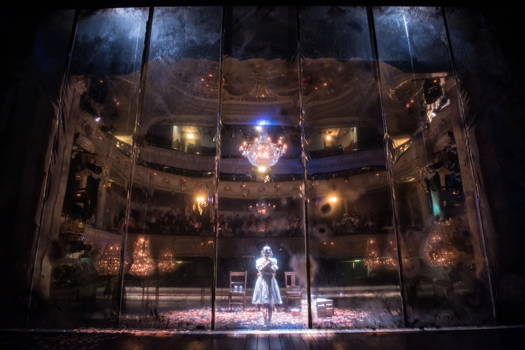
A scene from Tchaikovsky's Eugene Onegin at the Buxton Festival. Photo © 2019 Genevieve Girling
And we become aware of a young girl, about ten or eleven, say, practising ballet steps and reading. This, we assume, is the young Tatyana, and we will see her again as the opera proceeds. When the adult Tatyana appears, she too is lost in a book, a favourite romantic novel, no doubt. Shelley Jackson catches exactly the restlessness of someone caught between romantic dreams and maturity. It is interesting that the scenario makes her older than her more lively sister, Olga - a relationship paralleled by Kat'a and Varvara in Janáček's Kat'a Kabanová, incidentally. Jackson's fast vibrato won't be to everyone's taste, but she rises to the emotional crises of the Letter Scene, and her final meeting with Onegin, magnificently.
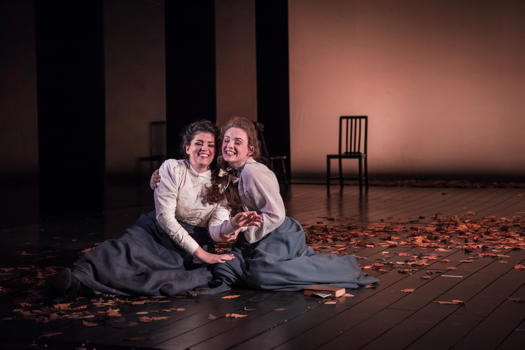
Shelley Jackson as Tatyana and Angharad Lyddon as Olga in Eugene Onegin at the Buxton Festival. Photo © 2019 Genevieve Girling
George Humphreys' slightly tenorish Onegin is not the cold, aloof figure of cliché, but brings a degree of awkwardness to his first meeting with Tatyana, and suggests a growing emotional awareness that makes his realisation, at their last meeting, that he has left it too late to claim Tatyana all the more devastating.
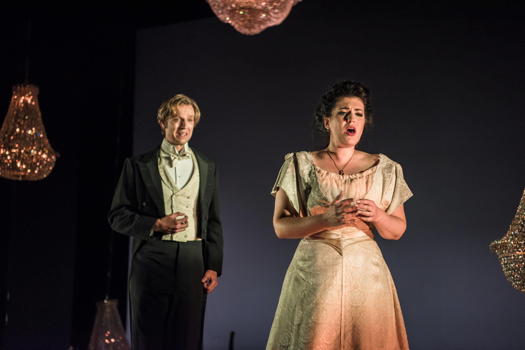
George Humphreys as Onegin and Shelley Jackson as Tatyana in Eugene Onegin at the Buxton Festival. Photo © 2019 Genevieve Girling
Counterpointed against them are Angharad Lyddon as a bright, sparky, level-headed Olga, and David Webb as Onegin's friend Lensky, tempering his poetic fancies with a pronounced immature streak, and shading his big pre-duel Act II aria with poignant regret.
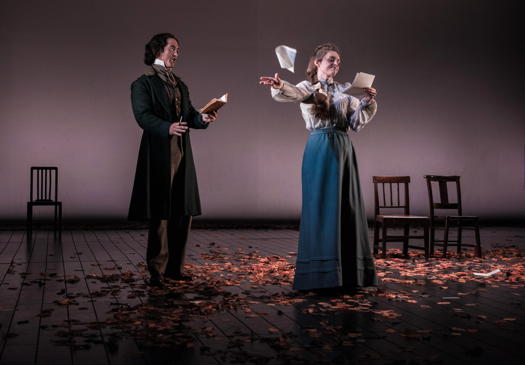
David Webb as Lensky and Angharad Lyddon as Olga in Eugene Onegin at the Buxton Festival. Photo © 2019 Genevieve Girling
Gaynor Keeble, as the girls' mother, Larina, and Ceri Williams as their nurse, Filipyevena, bring an element of grounded common sense to the scenario, while there is more to Joshua Bloom's rich-toned Gremin, Taryana's eventual husband, than dry pomposity. Joe Doody's Monseigneur Triquet provides an entertaining diversion before the tensions of the Act II party spiral out of control.
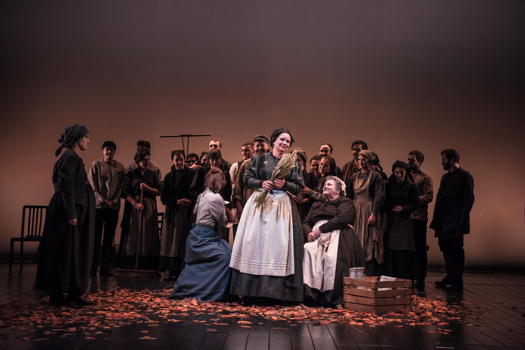
Gaynor Keeble as Madame Larina and Ceri Willams as Filipyevena in Eugene Onegin at the Buxton Festival. Photo © 2019 Genevieve Girling
Director Jamie Manton puts the emotions of the fluctuating relationships centre-stage, supported by Zoe Spurr's sympathetic lighting. The Festival Chorus makes an aptly Slavic sound, and the Northern Chamber Orchestra plays with warmth, tenderness and, where necessary, zest. The opera is sung in an uncredited English translation which is more functional than inspired.
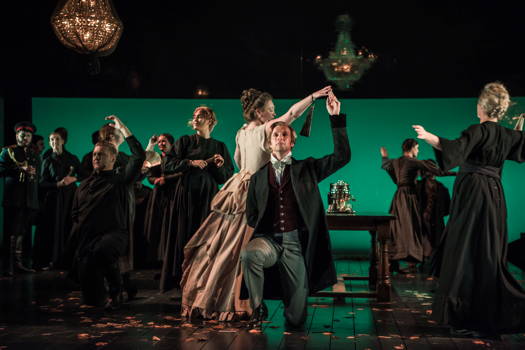
Angharad Lyddon as Olga and George Humphreys in the title role of Eugene Onegin at the Buxton Festival. Photo © 2019 Genevieve Girling
My only real complaint is that, once again, a two-act format has been imposed on a three-act piece. Re-setting the stage after the first scene of Act II obviously required a pause, but a substantial break is essential after the duel scene, to take on board the repercussions. Lurching straight from there into the Polonaise that opens Act III simply jarred.
That apart, the high musical and production values mark this as another vintage Buxton staging.
Copyright © 17 July 2019
Mike Wheeler,
Derby UK



